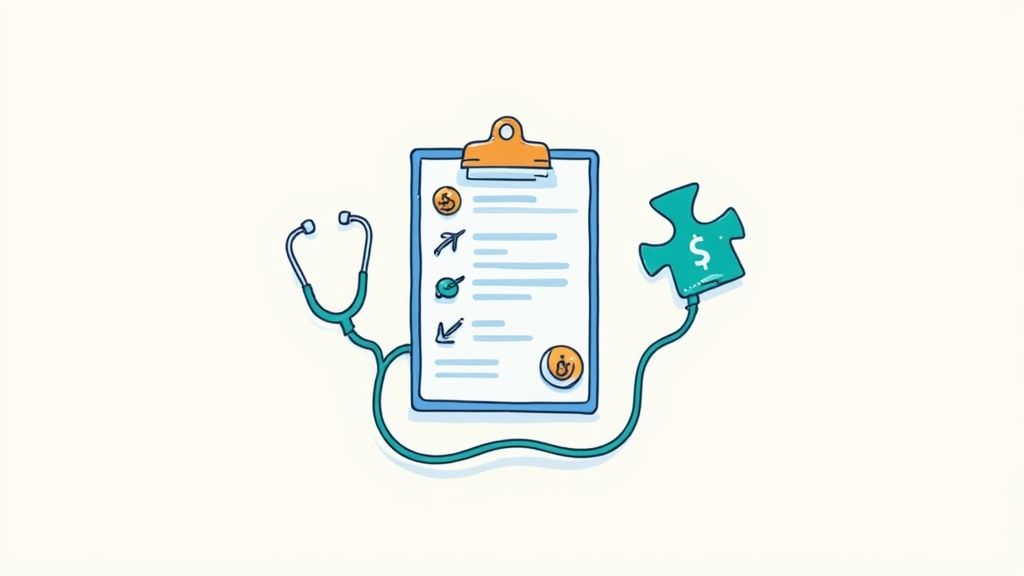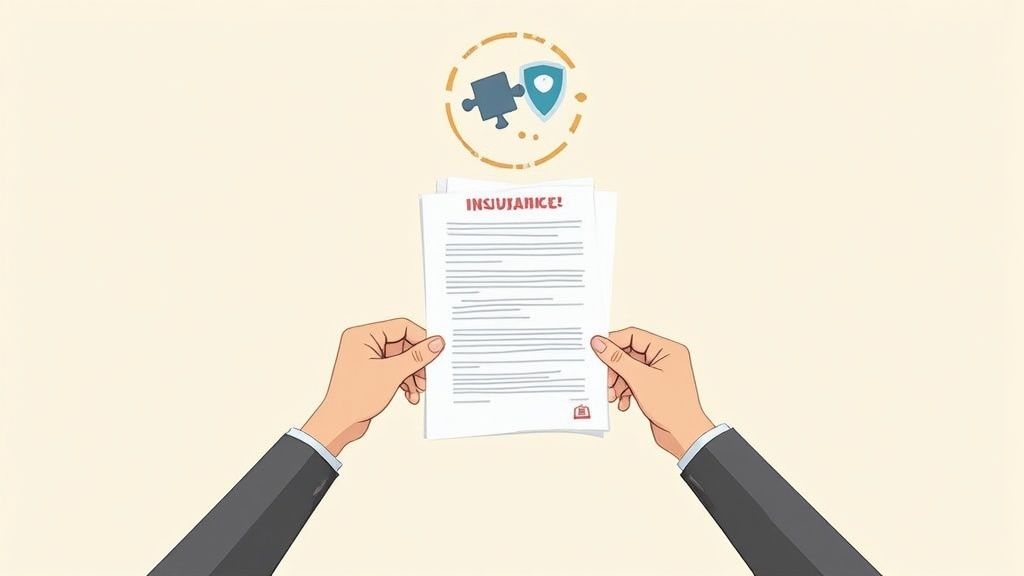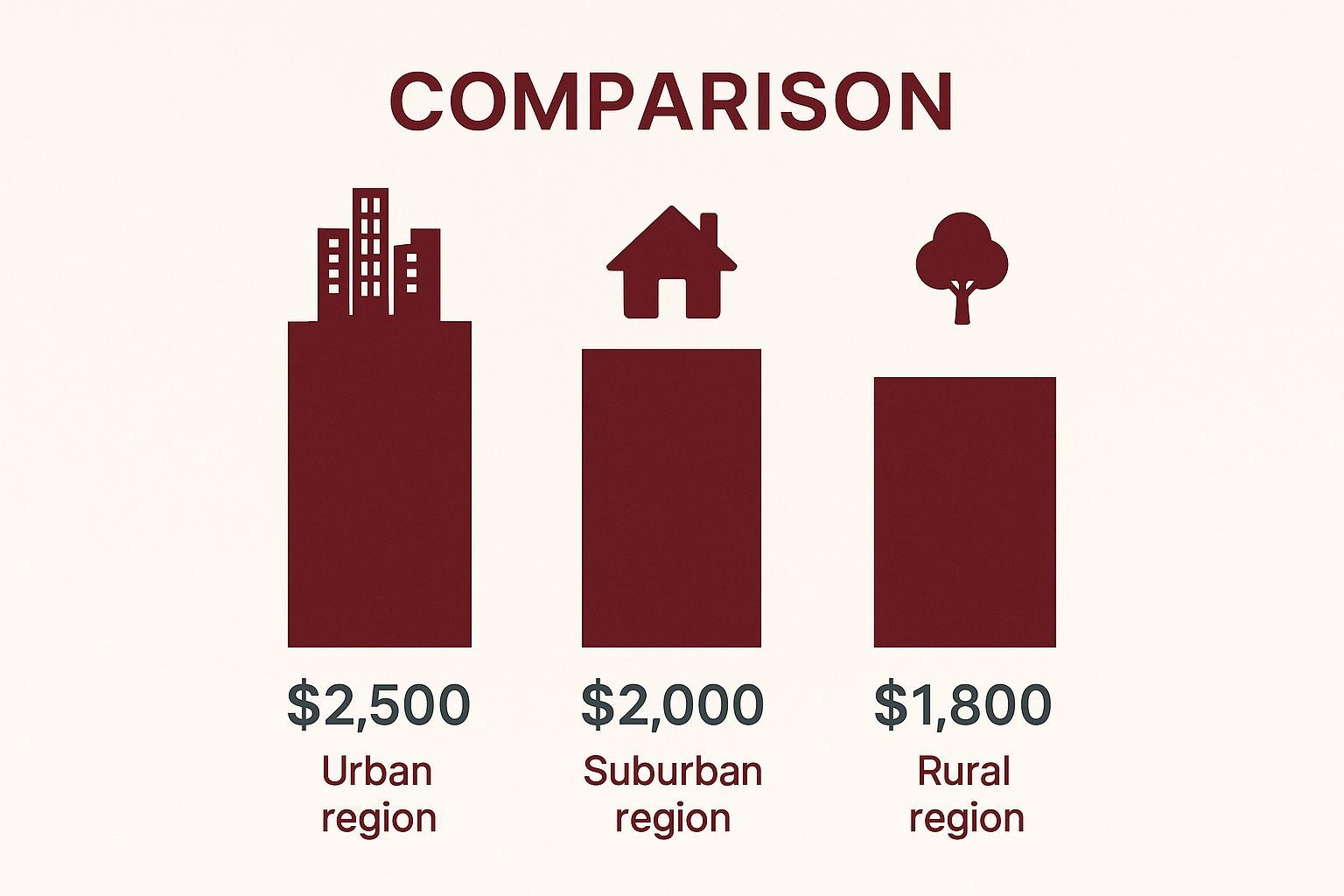When you start looking into an autism diagnosis, one of the first questions is always about the cost. The truth is, there's no single price tag. A diagnosis can run anywhere from a few hundred dollars for a basic screening to over $5,000 for a comprehensive evaluation.
Without insurance, most families find themselves paying somewhere between $1,500 and $3,000. But that's a wide range, and the final number is shaped by a lot of different factors.
Understanding the True Cost of an Autism Diagnosis

The financial uncertainty can feel overwhelming, but breaking down the variables helps take the mystery out of the final bill. Think of it like a home inspection. A basic check is affordable and will tell you if a major issue exists. But a deep dive into the foundation, plumbing, and electrical systems costs more because it gives you a complete picture for future planning and repairs.
It's the same with an autism diagnosis—the cost varies based on how deep you need to go. Several key elements come together to create a price spectrum that can feel confusing at first glance.
Key Variables Shaping the Final Price
The total cost is rarely a simple, flat fee. It’s a combination of moving parts that can either raise or lower what you pay out of pocket. Knowing what these are is the first step toward planning effectively.
- Geographic Location: It's no surprise that costs are often higher in major cities compared to smaller towns. This comes down to differences in overhead, demand, and the number of specialists available.
- Provider Credentials: The expert you see matters. A developmental pediatrician, a clinical psychologist, or a highly specialized neuropsychologist will all have different fee structures based on their expertise.
- Evaluation Complexity: A straightforward diagnostic assessment will cost less. But if you need a more comprehensive evaluation that also screens for co-occurring conditions like ADHD or learning disabilities, the price will naturally go up.
To give you a clearer picture, here’s a quick breakdown of what you might expect to pay for different levels of evaluation.
Quick Look at Potential Autism Diagnosis Costs
| Evaluation Level | Typical Cost Range (USD) | Who Typically Performs It |
|---|---|---|
| Initial Screening | $200 – $600 | Pediatrician, General Practitioner |
| Diagnostic Letter/Summary | $800 – $1,800 | Psychologist, Licensed Therapist |
| Full Diagnostic Report | $1,500 – $3,500 | Clinical Psychologist, Developmental Pediatrician |
| Comprehensive Neuropsych | $3,000 – $5,000+ | Neuropsychologist, Specialized Psychologist |
This table is just a guide, of course. The final cost will always depend on the specific provider and your unique circumstances.
The cost of diagnosing autism, particularly an early and thorough evaluation, is a significant part of total ASD-related expenses. Early diagnosis is critical for accessing effective interventions and support systems.
There's a good reason for the push toward early evaluation. In the U.S., about 78% of children with ASD received a developmental evaluation by 36 months of age, though these rates vary a lot from state to state. This national focus on early identification is all about opening the door to essential therapies and educational support as soon as possible. You can learn more about these autism statistics and what they mean.
Now, let's dive a little deeper into each of these cost factors so you can navigate your options with more confidence.
What Factors Drive the Final Price?
The huge price range for an autism diagnosis often leaves families scratching their heads. Why does one evaluation cost a few hundred dollars while another runs into the thousands? It's not random. Several key variables shape the final bill, and once you understand them, you can get a much clearer picture of what your family might pay.
Think of it like getting a quote to remodel your kitchen. The total cost isn't just one number; it depends on the size of the room, the quality of the countertops, and the experience of the contractor. An autism evaluation is priced in a similar way, built from factors like where you live, who is doing the assessment, and how deep they need to go.
Geographic Location and Regional Costs
Where you live plays a surprisingly big role. Just like a gallon of milk or a tank of gas costs more in some places than others, so do healthcare services. Evaluations in major cities with a high cost of living, like Los Angeles or New York City, are almost always more expensive than in a smaller town.
For instance, a comprehensive evaluation in a big city could easily be between $3,000 and $7,000. That same assessment in a less populated area might fall closer to the $1,500 to $3,000 range. This gap comes down to higher rent, salaries, and overall demand for specialized services in those urban hubs.
Provider Credentials and Expertise
The type of professional conducting the assessment is one of the biggest cost drivers. A proper evaluation requires highly trained specialists, and their level of expertise and training directly influences their fees.
You’ll see different price points depending on who performs the diagnosis:
- Developmental Pediatrician: A medical doctor who specializes in child development and can provide a thorough diagnostic assessment.
- Clinical Psychologist: A professional trained in diagnosing a wide range of mental and behavioral health conditions, including autism.
- Neuropsychologist: A specialist with advanced training in how the brain affects behavior. They often conduct the most in-depth (and most expensive) evaluations.
A full report from a neuropsychologist will naturally cost more than a diagnostic letter from a licensed therapist because it involves a much deeper level of testing, analysis, and interpretation.
The professional's experience is paramount. A clinician who specializes in autism, especially in complex or masked presentations, brings a level of insight that justifies a higher fee but can lead to a more accurate and useful diagnosis.
Public vs. Private Pathways
Families generally have two main routes for a diagnosis: the public system (often through school districts or state agencies) or the private sector. Each path comes with its own trade-offs, usually boiling down to a choice between time and money.
Going through the public system might be free or low-cost, but it almost always involves long waiting lists—sometimes stretching for months or even years. In contrast, a private practice can typically get you in much faster, but you'll be responsible for the full cost upfront if they don't take your insurance.
The Complexity of the Evaluation
Finally, the scope of the assessment itself is a critical piece of the puzzle. Not all evaluations are created equal. A straightforward assessment designed only to confirm or rule out autism will be less expensive than one that also needs to investigate co-occurring conditions.
If there are also questions about ADHD, anxiety, or a possible learning disability, the evaluation gets more complex. This means more tests, more of the clinician's time, and a more detailed final report—all of which increase the final cost of autism diagnosis. The goal is to get a complete, accurate picture of your or your child's unique profile.
Comparing Different Types of Autism Evaluations
Not all autism assessments are the same. When you start looking into the cost of an autism diagnosis, you’ll see pretty quickly that the price tag is tied to how deep the evaluation goes. Figuring out the different ‘levels’ available is the key to picking the right path for your family’s needs and budget.
Think of it like getting a car checked out. A basic diagnostic letter is like a quick error code scan—it confirms there’s an issue and gives you a name for it. On the other end of the spectrum, a full neuropsychological evaluation is like a complete engine teardown. It details every single component, explains why the problem is happening, and gives you a detailed plan to fix it.
Let's break down what you get at each level.
Comparison of Autism Evaluation Types
To make sense of the options, it helps to see them side-by-side. This table lays out the three main types of evaluations, what they typically include, when you'd use them, and a ballpark on the cost.
| Evaluation Type | What It Includes | Primary Use Case | Average Cost Estimate |
|---|---|---|---|
| Diagnostic Letter | A 1-2 hour clinical interview and a brief, formal letter from a psychologist confirming the diagnosis. | Workplace accommodations, personal clarity, or getting a prescription from a primary care doctor. | $500 – $1,500 |
| Full Report | Everything in a diagnostic letter, plus a detailed multi-page report outlining history, challenges, and clinical reasoning. | Securing therapy services, state disability benefits, or providing context for other healthcare providers. | $1,500 – $3,500 |
| Neuropsychological Evaluation | A comprehensive assessment (often 10+ hours) resulting in a lengthy report (20+ pages) on cognitive abilities, executive function, and more. | Requesting standardized test accommodations (SAT, ACT), school support (IEP/504), or untangling complex co-occurring conditions. | $3,000 – $10,000+ |
As you can see, the right choice really depends on what you need the diagnosis for. A simple letter works for some situations, while others demand a much deeper dive.
The Diagnostic Letter: A Quick Confirmation
A diagnostic letter is the most straightforward and affordable route. It usually involves a clinical interview that lasts an hour or two, along with a review of self-report questionnaires. What you walk away with is a formal letter from a psychologist that confirms the diagnosis.
This option is often exactly what’s needed for:
- Workplace Accommodations: Giving an employer the formal proof they need to provide reasonable adjustments.
- Personal Clarity: Finally getting a professional opinion to better understand yourself or a loved one.
- Accessing Medication: Sharing the letter with a psychiatrist or primary care physician who can then manage prescriptions.
While it’s easy on the wallet, a simple letter won't give you a deep dive into an individual’s unique profile, their strengths, or their specific challenges. You can get more details on this first step in our guide on how to get tested for autism.
The Full Developmental Report: A Deeper Picture
A full developmental or diagnostic report takes things a step further. It includes everything from the initial evaluation but expands it into a detailed, multi-page document. This report gives a much richer picture of a person’s history, their current struggles, and the clinical reasoning that led to the diagnosis.
A full report is often the key to unlocking more substantial support, like ongoing therapy services or certain state disability benefits. It gives other healthcare providers the context they need to offer coordinated and effective care.
A comprehensive report is more than just a diagnosis; it’s a personalized roadmap. It outlines specific recommendations and strategies tailored to an individual's unique neurotype, serving as a foundational document for future support planning.
The Neuropsychological Evaluation: The Blueprint for Accommodations
The most extensive—and most expensive—option is the neuropsychological evaluation. This is a very in-depth assessment that can take many hours and results in a long, detailed report, often 20 pages or more. It measures everything from cognitive abilities and academic skills to executive functioning and emotional regulation.
This level of detail is specifically required for things like:
- Standardized Test Accommodations: Getting the documentation needed for extra time on exams like the SAT, ACT, GRE, or GMAT.
- School-Based Support: Providing the evidence required for an Individualized Education Program (IEP) or 504 plan in a school.
- Complex Cases: Untangling co-occurring conditions, like figuring out where autism ends and a learning disability or ADHD begins.
Autism awareness has grown massively, and so have the number of diagnoses. In the United States, 1 in 36 children is now diagnosed with ASD, which is a staggering 317% increase since 2000. This jump is largely due to better identification and a broader understanding of what autism looks like, making it more important than ever for families to know their diagnostic options.
How to Navigate Insurance Coverage
Trying to get insurance to cover the cost of an autism diagnosis can feel like you’re trying to decipher a secret code. But it doesn’t have to be a battle you go into unprepared. With the right approach, you can make sense of your benefits and seriously cut down on your out-of-pocket costs.
The first move is always to get comfortable with the language. Insurance policies are notorious for confusing terms, but they usually boil down to a handful of key concepts that directly impact what you'll pay. Getting these down is a game-changer.
Decoding Your Insurance Policy
Before you even think about calling your insurance company, it helps to know what you’re looking for. These three terms are the bedrock of most plans and will pop up again and again.
- In-Network vs. Out-of-Network: This is a big one. In-network providers have a pre-negotiated deal with your insurance company, which means much lower costs for you. Going out-of-network is almost always a more expensive route, and sometimes it isn't covered at all.
- Prior Authorization: Think of this as getting permission first. Many insurance plans require approval from them before you can move forward with an evaluation. If you skip this step, you risk having the claim denied entirely.
- Medical Necessity: This is the magic phrase insurers use. It’s their standard for deciding if a service is truly essential for your health. Your provider will likely need to send in paperwork to prove the diagnostic evaluation is medically necessary.
Once you’ve got a handle on this lingo, you're ready to make the call. This is your chance to get straight, specific answers. Don't be shy—ask as many questions as you need to until you feel confident you understand what's covered.
"Navigating insurance is a process of advocacy. You are your or your child's best advocate. Being persistent, organized, and informed is the key to unlocking the benefits you are entitled to."
Questions to Ask Your Insurance Provider
When you get someone on the phone, grab a pen and paper. You’ll want to write down the date, time, and the name of the person you spoke with. Here’s a quick checklist to guide the conversation:
- Do my benefits cover developmental or psychological testing for an autism diagnosis?
- Can you confirm if Dr. [Provider's Name] at [Clinic's Name] is an in-network provider?
- Is prior authorization required for this kind of testing? If so, what is that process like?
- What are my benefits for specific CPT codes, like 96116 (neurobehavioral status exam) or 90791 (psychiatric diagnostic evaluation)?
- What are my deductible, copay, and coinsurance amounts for these services?
Getting clear answers here will paint a much more accurate financial picture. And if a claim gets denied? Don't panic. You have the right to appeal. This usually involves sending a formal letter along with more documentation from your provider explaining why the evaluation is medically necessary.
For more support, our article on navigating the autism diagnosis process offers some great additional context.
Finding Financial Assistance and Lower-Cost Options
When insurance coverage falls short or just isn't an option, the out-of-pocket cost for an autism diagnosis can feel like a massive roadblock. But a high price tag doesn't have to be the end of the road. There are a number of alternative pathways that can make a high-quality evaluation much more accessible and affordable.
Many families find success by looking beyond traditional private practices. These routes often provide the same level of diagnostic accuracy but at a fraction of the cost, making sure finances don't stand in the way of getting crucial answers.
Tapping into Community and State Programs
One of the most effective strategies is to explore local and state-funded resources. These programs are specifically designed to support families and reduce the financial burden of developmental evaluations. Many are even free or operate on a sliding scale based on your income.
Here are some excellent places to start your search:
- University Training Clinics: Psychology or medical departments at local universities often run training clinics where graduate students conduct assessments. Don't worry—these students are always closely supervised by licensed, experienced professionals, and the services are offered at a greatly reduced cost.
- Early Intervention Services: For young children (typically under three), state-run Early Intervention programs can provide free developmental evaluations to determine if they're eligible for support services. While this isn't always a formal medical diagnosis, it's a critical first step.
- Non-Profit Grants: Many non-profit organizations are dedicated to helping families cover autism-related expenses. Organizations like the United Healthcare Children's Foundation or local autism societies may offer grants specifically for diagnostic services.
Don't underestimate the power of just asking for help. Many providers would rather find a solution with you than turn someone away simply because of cost.
Working Directly with Providers
Even if a provider's initial quote seems completely out of reach, there might be some wiggle room. Many clinicians are passionate about helping their communities and have systems in place to support families with different financial needs.
When you're talking with a potential clinic, don't hesitate to ask about their payment options. See if they offer sliding scale rates, which adjust the fee based on your family's income. You can also ask about setting up a payment plan, which allows you to spread the cost over several months instead of paying a big lump sum all at once. This simple conversation can often unlock a much more manageable path to getting a diagnosis.
Why a Diagnosis Is a Long-Term Investment
It’s easy to get sticker shock when you see the cost of an autism diagnosis. But looking at it as a one-time expense misses the bigger picture entirely. A better way to think about it is as the single most important investment you can make in a person's future—one that unlocks a lifetime of understanding and tailored support.
Think of the formal diagnosis as the key. Without it, so many doors to essential resources remain locked. We're talking about everything from school-based help like an Individualized Education Program (IEP) to specialized therapies and even government benefits. Trying to get the right help without that official piece of paper can feel like an endless uphill battle.
Reducing Long-Term Costs
Getting a clear and accurate diagnosis early on actually saves a massive amount of money in the long run. When an autistic person's needs aren't met, the personal and societal costs can be astronomical.
The economic impact of autism in the United States was a staggering $268 billion back in 2015. Without effective support systems in place, that number is projected to hit $461 billion by 2025. That figure covers everything from medical care and special education to lost productivity. You can read more about these significant economic impacts.
By investing in a diagnosis now, you're essentially creating a roadmap for a better quality of life. It clarifies the best path forward for therapies, educational strategies, and personal growth, which can head off much bigger struggles later.
For adults, getting an official diagnosis is just as critical. It can bring profound self-understanding and is often necessary to secure accommodations in the workplace. If you're starting this journey, our guide to an adult autism diagnosis online has some great insights.
Ultimately, that initial cost is a small price to pay for a lifetime of effective, targeted support.
A Few Common Questions About Diagnosis Costs
Let's be honest, figuring out the financial side of a diagnosis can feel like its own full-time job. You're not alone in having questions. Here are some quick, clear answers to the things families most often ask when trying to budget for an autism diagnosis.
How Much Should I Expect to Pay Without Insurance?
If you're paying out-of-pocket, the average cost for a standard autism evaluation in the U.S. usually lands somewhere between $1,200 and $3,000. That said, it’s not uncommon to see that number climb to $5,000 or more, especially if the assessment is complex or you’re working with a top-tier specialist.
Why Is a Screening So Much Cheaper Than a Full Evaluation?
Think of a screening as a preliminary health survey. It’s a quick-and-dirty look, often just a checklist, to see if there are enough flags to warrant a deeper investigation. It’s not designed to give you a formal diagnosis.
A full diagnostic evaluation, on the other hand, is the real deal. It’s a comprehensive process that brings in a team of specialists for direct observation, standardized tests, and in-depth interviews. It requires a significant amount of time and clinical expertise, and that's why the cost is higher.
A screening just points you in a direction by identifying potential risk. A full evaluation gives you a definitive, actionable diagnosis. The price difference really comes down to the depth and certainty you get from each one.
Are There Hidden or Additional Costs I Should Know About?
Yes, sometimes there are. It's smart to be prepared. Beyond the fee for the evaluation itself, you might run into extra costs for things like:
- Follow-up appointments to go over the results and plan the next steps.
- Extra reports or letters you might need for schools, therapies, or other providers.
- More specialized testing if the clinician suspects other co-occurring conditions.
To avoid any surprises, always ask your provider for a complete, itemized breakdown of all potential fees upfront. It will make budgeting for the entire diagnostic journey a whole lot less stressful.
At Sachs Center, we specialize in providing clear, accessible, and expert online evaluations for Autism and ADHD. If you're ready to get definitive answers in a compassionate, supportive setting, book your virtual assessment with us today. Learn more about our diagnostic services at sachscenter.com.


